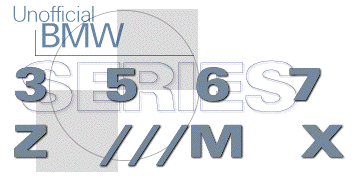|
Home
E12
E24
E28
E30
E34
E36
Z3
E39
E46
X5/E53
ALL
Ron Stygar
Carl Buckland
Dale Beuning
Forums
Help

From digest.v7.n386 Mon Oct 6 11:36:02 1997
From: "Carl Buckland" <buckland_at_mail.xmission.com>
Date: Mon, 6 Oct 1997 09:04:17 +0000
Subject: R1 Tire wear: a few suggestions
> > In a message dated 10/5/97 3:41:48 PM, Msport5 wrote:
> > >Chris Brennan asks:
> > >>What is the "normal" life expectancy of the tires? I
> > >>planned to start rotating after the last event. Did I wait too
> > >>long? Any comments from rabid drivers appreciated. The R1's
> > >>were on my 95 M3 with stock suspension. TIA.
>
> R1's wearing on the "groove o' doom" is indicitive of too low a tire
> pressure being run. For my '95 M3 they thought the best pressure to
> run based on the wear patterns was 36 lb. in the front and 35 lb. in
> the rear. When I pumped them at that level and returned after
> Driver's School they told me I was right on the money as I was
> perfectly on the small sidewall groove for tread wear.
>
xxxxxxxxxxxxxxxxxxxxxxxxxxx
R1 Tire Wear
- Is a function of *alignments* more than anything else. Too much
toe in (rear) or toe out (front) will eat up tires in no time.
- Radical toe out in the front will give you more neg camber, and
quicker turn in, but at the price of rapid tire wear.
-I tried to tame an overstear problem with over a half inch of
rear rear toe in (1/8 to 1/4 is plenty), and went thru 12 R1's
in a few days (resulting in having to race the second day of
the Solo Trials Nationals on STEEL).
2)Camber (front). "They" say that R1's "don't need much negative
camber because of the stiff sidewalls. Maybe....all I know is, that
since I installed the Dinan -4 degree camber plates (no adjustsments
possible), I have had very even tire wear, and I have zero push. I
like at least 3 degs of neg camber in the front.
3)Camber (rear). Easy to adjust at the track. A little more than
factory setting will reduce oversteer. Too much will eat up the
inside edges, and reduce traction in a straight line. I had about 3
degs of neg camber in the rear at one time, and the burn out marks
were just two skinny little ribbons. I say, keep the rear tires
nearly flat (1.5 to 2 deg's is fine), and use no more than 1/8 inch
toe in.
4)Tire Pressures. On the track, start at about 32 in the front, and
31 in the rear. Warm them up gradually, and they will soon be in the
mid to upper 30's. When you come in for your first pits, drop the
fronts to 33 to 34, and the rears to 32 to 33 (1 lb differential). I
then KEEP them at that level for the rest of the day. I don't have a
groove of doom problem. I think that you "might" get a little better
wear with slightly higher pressures, but at the cost of grip.
5)Sidewall indicators. If you are scrubbing off the "line" on the
outer edge of the tire, your pressures are too low. If you are not
getting up to the line, you have too much. Now this is hardly a
replacement for pyrometer readings, but that is a whole different
discussion.
6)When are the R1's cooked? When you see cords! In competition, you
want to retire them long before that, of course. But since this is,
for the most part, a gentleman's track event group, I say "run them
until you see cords." If you follow this tennant, be sure that you
have a back up set of wheels/tires so that you don't hit the wall (so
to speak) half way thru the day, and have to retire to the bar. I have
run on four corded tires for several laps, and when I came in, it was
"just more cords," but no further drama. They will go all the way to
steel patches before they are too scary. Like I said, I have *raced*
on steel. I don't reccomend it, but it is possible in a pinch.
One final note. On a warm day, after several really hard
laps, you might feel your tires are going away. They get too hot, the
tire pressure is way high, and the compound is molten. Bring you car
in, let everything cool off, and they probably will be ok again.
Oh yeah, don't forget to HEAT CYCLE your new tires. I always shave my
tires to 4/32's, yet still get a lot of mileage out of them (420 miles
at Laguna Seca last spring on one set!). I attribute this good wear
to the fact that I heat cycle every set. (that, and other factors
talked about above. good camber settings help a lot. so does using
your head on the track) Mount them a few days before an event, run em
hard on the twistys, and put them away for 48 hours. The BEST way to
heat cycle is to run them on the track for 5 to 10 laps, get them
plenty hot (150), and then put them away. That's one of the main
reasons for owning two sets of race wheels, so that you have that
option. Save your almost warn out tires, heat cycle the new ones,
put back on your old tires, and run them the rest of the day. The
next day (or better yet, 2 days later), bring out the new shoes.
With all this said, I am going to slicks next year. Anyone have any
insights into fender flairs? 10" is the only size I have seen in 17"
slicks.
Carl
Unofficial Homepages:
[Home]
[E12]
[E24]
[E28]
[E30]
[E34]
[E36]
[Z3]
[E39]
[E46]
[X5/E53]
[ALL]
[ Help ]
|